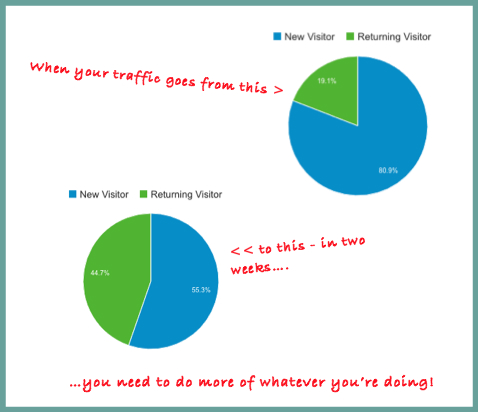Generally speaking, they understand what needs to be done. And they don't have time to do it.
On the other hand, I've worked with a few business owners who I describe as "going on faith." They have a website and pay monthly management fees because they know they need a website, and they know they don't have time to manage it. They are likely to say, "yeah, we have a website, but it's not doing much for us."
And sometimes, they're right.
 What I usually find, however, is that the website is working fine and it's not helping the business much because the site is managed only in accordance with the site provider's schedule.
What I usually find, however, is that the website is working fine and it's not helping the business much because the site is managed only in accordance with the site provider's schedule.If your business is at all seasonal or cyclical, that's not good enough. Everything about your business, including your website and content plan, must be managed to make the most of seasonal peaks and other factors that are specific to your business.
The image above illustrates an important point. It's Google Analytics' representation of a website I manage for a client. In this case, the website provider and hosting company handles AdWords, PPC campaigns and keyword management. Those activities are monitored and reported on monthly, and reviews and account changes are handled quarterly - with absolutely NO regard for the local, seasonal, and sales cycle intelligence available at the business location.
Remote website management can be great, folks. But remote management without any connection to the business isn't good enough.
Why an Increase in Returning Visitors is Important
When you have an increase in returning visitors, it can mean a lot of things - you can figure out what by looking at a variety of stats and visitor behavior - but in general, it means your visitors (prospects) are thinking about buying from you. By understanding your business cycle, local factors, and digging just a little deeper into your analytics, you can adjust your content marketing (including social media updates) to quickly close those sales and keep new prospects moving toward a purchase.Don't Fear the Analytics: How to Adjust Your Marketing Efforts
When you notice a change in visitor traffic/behavior, don't freak out. Too many smart business owners sell themselves short when it comes to managing their websites and online marketing presence. I hear a lot of "I don't know anything about websites; I just know how to run my business!"What I say to them - emphatically - is this: what you know about your business must inform the way your website is managed. Even if you picked your website provider because you didn't have time to spend on online marketing, don't ignore your website! Don't assume your web hosting company understands your business, and don't fear the analytics. Review those monthly reports and adjust accordingly - it's your business, and you'll get better results if you are involved in the way that site is managed.
You don't need Big Data to increase sales! Small businesses can use what they know about
their customers to increase sales and improve customer service.
If you notice more people visit your money-back guarantee page, remind your sales team to mention that policy every time they talk to a customer. If you find an increase in visits to your service offerings page, highlight some customer testimonials on your social media channels. Or (if you haven't already) add a link to those testimonials and your customer service email or chat contact from the services page. If you're using email marketing (and if you can, you should!) changes in visitor behavior will give you excellent ideas about what you should be sending out to your new prospects and existing customers.
When You Need 38 Hours in a Day
It's a common complaint: many small business owners are frustrated with their websites and online marketing efforts, but not because they don't understand, or don't believe, that their marketing investment is working for them. They just don't have time to give those analytics reports the time they need. If that's your problem, I can help. I love working with small businesses to maximize their online marketing efforts.________________________________________
Got 15 minutes? I offer free consultations that won't keep you from your business very long.
Let's talk.
